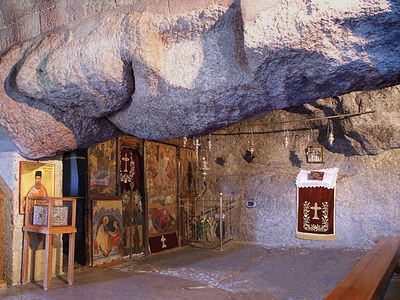 Revelation: Removing the VeilThis revelation was given by God to the Apostle John because we needed to know it.
Revelation: Removing the VeilThis revelation was given by God to the Apostle John because we needed to know it.
“>Part 1, 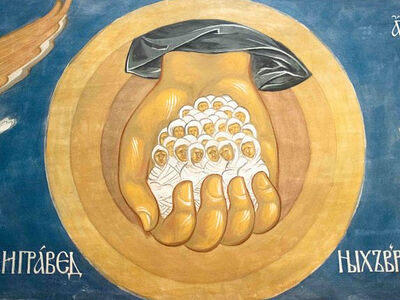 If Christ Is With Us, Death Is DefeatedThe book of Revelation teaches us a lot, especially when we begin to carefully delve into its words, when we see how Christ holds the world in His hands and acts with wisdom in all things.”>Part 2,
If Christ Is With Us, Death Is DefeatedThe book of Revelation teaches us a lot, especially when we begin to carefully delve into its words, when we see how Christ holds the world in His hands and acts with wisdom in all things.”>Part 2, 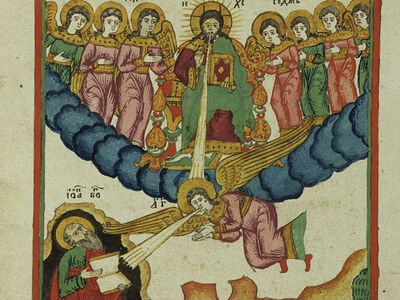 Why Did the Lord Leave Man the Book of Revelation?Only the people of God, the saints, can receive revelations from God, and only they can interpret them, because a revelation, words from God, is given from God, from the Holy Spirit.”>Part 3,
Why Did the Lord Leave Man the Book of Revelation?Only the people of God, the saints, can receive revelations from God, and only they can interpret them, because a revelation, words from God, is given from God, from the Holy Spirit.”>Part 3, 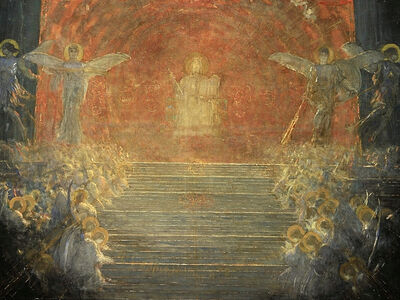 For the Time Is at Hand…We have to understand that God acts outside of time, and the events of Revelation don’t relate only to the end times.”>Part 4,
For the Time Is at Hand…We have to understand that God acts outside of time, and the events of Revelation don’t relate only to the end times.”>Part 4,  Blessed Is He That Readeth…Christ sent the revelation through an angel to His servant the Apostle and Evangelist John, who conveyed the word of God and the testimony of Jesus Christ about what he saw and heard.”>Part 5,
Blessed Is He That Readeth…Christ sent the revelation through an angel to His servant the Apostle and Evangelist John, who conveyed the word of God and the testimony of Jesus Christ about what he saw and heard.”>Part 5,  He Hath Made Us Kings and PriestsA man who is close to God, my dears, truly feels like a king—he has no need of anything. At the same time, he may have absolutely nothing.”>Part 6,
He Hath Made Us Kings and PriestsA man who is close to God, my dears, truly feels like a king—he has no need of anything. At the same time, he may have absolutely nothing.”>Part 6,  John, Our Companion in Tribulation, and in the Kingdom and Patience of Jesus ChristOne of the most significant and frequent references to the Holy Trinity is in the text of Revelation.”>Part 7,
John, Our Companion in Tribulation, and in the Kingdom and Patience of Jesus ChristOne of the most significant and frequent references to the Holy Trinity is in the text of Revelation.”>Part 7,  Because Thou Hast Left Thy First Love…The greatest miracle is that the Church exists.”>Part 8,
Because Thou Hast Left Thy First Love…The greatest miracle is that the Church exists.”>Part 8,  Fear None of Those Things Which Thou Shalt SufferThus, God says the following: He is the First and the Last, the Beginning and the End. Nothing exists outside of Him; in Him is everything. He is the Beginning and End of all things.”>Part 9
Fear None of Those Things Which Thou Shalt SufferThus, God says the following: He is the First and the Last, the Beginning and the End. Nothing exists outside of Him; in Him is everything. He is the Beginning and End of all things.”>Part 9
Part 9 concluded with His Eminence saying: “We must remain faithful until the end of our lives and must be ready to suffer for our faith.”
***
We can’t neglect this point in the Gospel. Why? What, is God so strict that He doesn’t care that we’ll be burned, torn to pieces, tortured, and so on? It’s not that God is so cruel and wants us to be tortured. But if you love God, if you love someone or something, such love doesn’t waver, doesn’t diminish, doesn’t depend on circumstances. You love someone because you feel it and it gives meaning to your life. And the more you have the chance to express your life, the more you acquire fullness. But the expression of love isn’t when you receive or take, but when you give. Then love becomes complete and perfect. When you take, you feel bad, incomplete, because you take something from someone else—someone who either loves you or doesn’t. Someone who takes and feels satisfied doesn’t love. He loves himself, and says: “Look how wonderful it is: They give me things, they give me money, they give me what I need. It makes me very happy.” He’s unhealthy. We should like to give things. We should get joy from what we give away. Of course, if someone comes and brings you a gift, you might not need it, you might not want such a gift at all, but you accept the gift so as not to upset your friend, to bring him joy. When you receive it in order to please another, then you also rejoice. But if you accept it because it’s beneficial for you, then that’s greed. Holy Scripture says: It is more blessed to give than to receive (Acts 20:35). There’s much more grace and happiness when you give. When you give, then you truly find fullness in love. When we give our heart to God, our being, then we’re filled with love in God and we truly overcome death, the temporal, and all that is transient. Then man receives the crown of life from Christ.
 Prophet David
Prophet David
The epistle to the Bishop of the Church of Smyrna concludes with the words: He that hath an ear, let him hear what the Spirit saith unto the Churches; He that overcometh shall not be hurt of the second death (Rev. 2:11). Christ often utters these words: He that hath an ear, let him hear. And that’s what He says here. We all have ears. Is there anyone among us without ears? We all have ears and we all hear. Even those who are hard of hearing and wear a hearing aid hear. But which of us hears? Do we truly hear? It’s a big question. I was horrified to see among Church people those who can be in church day and night, constantly listen to homilies and talks, trying not to miss a single feast, moleben, fast, vigil, and so on—but God forbid you should hear how they talk. God save us from such people. I say this with complete awareness. Such  Anger—How to Conquer the Beast Inside YouI get terrified as I hear this! What should I do, a sinful and fallen man? How can I learn to control myself? How can I “conquer” sinful anger inside me?
Anger—How to Conquer the Beast Inside YouI get terrified as I hear this! What should I do, a sinful and fallen man? How can I learn to control myself? How can I “conquer” sinful anger inside me?
“>anger, such mental perversion (I don’t mean bodily or otherwise), such petrification and callousness can live inside a man. Why? Because egotism grows within him; he’s lacking in humility. But the Lord constantly repeats to us: He that hath an ear, let him hear. As the  Holy King and Prophet David (Tenth Century B.C.)The holy Prophet David was the youngest of the eight sons of Jesse, the elder of the city of Bethlehem, a descendant of Judah, to whom his father Jacob promised rule over the Israelites until the Coming of Christ the Savior.”>Prophet David says in Psalm 134, as we sing at the Polyeleos at Vigil: They have a mouth but shall not speak, eyes have they and shall not see. Ears have they and shall not hear, nor is there any breath in their mouth (vv. 16-17). Who is this about? About a man who has sensory organs but doesn’t hear, doesn’t speak, doesn’t see anything that’s happening around him. He’s trapped inside his greed and self-satisfaction. He’s satisfied with everything, he doesn’t care about his salvation, about his path to the Kingdom of God. He worries about nothing; everything is arranged for him. Of course, surprises await him.
Holy King and Prophet David (Tenth Century B.C.)The holy Prophet David was the youngest of the eight sons of Jesse, the elder of the city of Bethlehem, a descendant of Judah, to whom his father Jacob promised rule over the Israelites until the Coming of Christ the Savior.”>Prophet David says in Psalm 134, as we sing at the Polyeleos at Vigil: They have a mouth but shall not speak, eyes have they and shall not see. Ears have they and shall not hear, nor is there any breath in their mouth (vv. 16-17). Who is this about? About a man who has sensory organs but doesn’t hear, doesn’t speak, doesn’t see anything that’s happening around him. He’s trapped inside his greed and self-satisfaction. He’s satisfied with everything, he doesn’t care about his salvation, about his path to the Kingdom of God. He worries about nothing; everything is arranged for him. Of course, surprises await him.
And it concludes: He that overcometh shall not be hurt of the second death (Rev. 2:11). He who overcomes won’t be overcome by the second death. You see, there are two deaths. One death is the one we all pass through, the transition from this transitory life to eternity. We all pass through it—both the old and young, the great and small, the poor and rich, the important and insignificant. Whoever you are, you’ll pass through this gate. This has its own beauty, something kind and good. 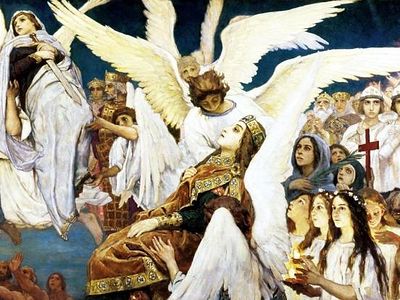 Perspectives on DeathSo, I was thinking: why don’t we all write a summary of the life we lived at some point? I bet without a doubt it’ll scare us; some will break out into a cold sweat, and from this, good life changes will be born. Mortal memory, after all, is so… creative.
Perspectives on DeathSo, I was thinking: why don’t we all write a summary of the life we lived at some point? I bet without a doubt it’ll scare us; some will break out into a cold sweat, and from this, good life changes will be born. Mortal memory, after all, is so… creative.
“>Death isn’t so terrible. The older I get, the more I understand what wisdom is concealed in death. Imagine if we lived here forever, what would become of us? Now we know that we’re going to die, but still, we try to devour others before they die. And if we thought we’d never die, what would we become? One death is the ordinary biological death, a physical phenomenon. It came to us after the fall of Adam, but nevertheless, death is in human nature. The second death is the separation of man from God. This is a terrible death—the separation of man from God, from Life itself. This second death is eternal hell, eternal punishment, suffering, pain, eternal torment. But those who overcome, who cope, who remain faithful unto death, will not suffer harm from the second death, spiritual death, although they will experience the first death.
This concludes what God wanted to say to the Bishop of the Church of Smyrna. A few years later came the fulfillment of what was said by the Holy Spirit—he received a martyr’s death. You see how beautifully it’s described here that God sees deeds, sorrows, and poverty. But the judgment of God is one thing, and the judgment of man another. One is the eyes of God, the other the eyes of man. For people, the Bishop of the Church of Smyrna was poor, unfortunate, and slandered, but in the eyes of God, he was rich, important, and recognized. Everyone around him rebelled against him, but God said to him: “Fear not,” because fear is not a manifestation of love. He who loves isn’t afraid, because the more people rebel against him and the more danger he faces, the more he can show his love, the more his love is perfected, the more he’s united with God. And whoever puts himself in the hands of God, trusting Him, doesn’t fear.
Often, people come who are going through very difficult times, and you tell them: “Put yourself in God’s hands.” They respond: “Yes, but, but, but…” Until you understand this, until you learn to put yourself in the hands of God, you will suffer from fear, from various fears. And you’ll be haunted by thousands of fears, you’ll be afraid of your own shadow; every day you’ll be afraid of what will come from here or what will come from there. You’ll run, take tests, undergo thousands of examinations, you’ll be afraid that all the diseases of this world are lying in wait for you, all the germs you’ve learned about or heard about somewhere will hunt you, and this  Fear None of Those Things Which Thou Shalt SufferThus, God says the following: He is the First and the Last, the Beginning and the End. Nothing exists outside of Him; in Him is everything. He is the Beginning and End of all things.
Fear None of Those Things Which Thou Shalt SufferThus, God says the following: He is the First and the Last, the Beginning and the End. Nothing exists outside of Him; in Him is everything. He is the Beginning and End of all things.
“>fear will drive you crazy.

Put yourself in God’s hands. If you trust God then you’ll find peace. And no matter how much you resist and fuss, nothing will change. You won’t be able to calm down. Don’t be afraid, because you’re in God’s hands. That’s how you’ll learn to stay peaceful. That’s the secret. Those of us who are afraid, who are covered by these fears, must learn this secret, must learn this key—putting ourselves in God’s hands. Then our fears will go away and we’ll calm down. Of course, this doesn’t mean that you’ll have an easy life, that everything will be great for you, that you’ll wake up every morning with a smile. No. You’ll go through tribulations, but God will see your tribulations. And your tribulations will last “ten days,” not indefinitely. Perhaps you’ll die, God will let you die, He won’t save you from death; He’ll let you be torn into a thousand pieces. But we’re not looking for deliverance from this. In any case, the first death awaits everyone. If you escape this time, you’ll die another time. Those who rose from the dead died: Lazarus rose, but he died again; others were healed and then died; they all died. Fear the second death. Think about it, about separation from God, the true Life. This is a real problem.
The second lesson we learn from this, which is constantly being talked about, is whether we hear what God is talking about. Are our ears open? If our ears were open and we truly heard the word of God, would we really be who we are? Would we live the way we live? Would we think the way we think? Would we be deceitful, avaricious, merciless, cruel, inhuman, would we justify ourselves and our cruelty, our insensitivity and a thousand other things that we justify in ourselves just to avoid taking one step towards virtue? The truth is that people who have opened their ears and heard the word of God have made a leap in their lives, while the rest of us are treading water. We run, run, run, but we’re running in place. Actually, it would be good if we stayed in place, but it turns out that we’re rolling backwards. But we think we’re running.
 Let’s move on to the next bishop. We said that we would read quickly to see the full picture, all the terrible things that are described in Revelations. We’re still at the beginning and making our way—the most terrifying thing is yet to begin. And to the angel of the Church in Pergamos write; These things saith He Which hath the sharp sword with two edges (Rev. 2:12). Pergamos is another city of Asia Minor.
Let’s move on to the next bishop. We said that we would read quickly to see the full picture, all the terrible things that are described in Revelations. We’re still at the beginning and making our way—the most terrifying thing is yet to begin. And to the angel of the Church in Pergamos write; These things saith He Which hath the sharp sword with two edges (Rev. 2:12). Pergamos is another city of Asia Minor.  Hieromartyr Antipas the Bishop of Pergamum and Disciple of St John the TheologianBy his personal example, firm faith and constant preaching about Christ, Saint Antipas began to turn the people of Pergamum from offering sacrifice to idols.
Hieromartyr Antipas the Bishop of Pergamum and Disciple of St John the TheologianBy his personal example, firm faith and constant preaching about Christ, Saint Antipas began to turn the people of Pergamum from offering sacrifice to idols.
“>St. Antipas, a martyr, was the Bishop of Pergamos. He received a martyric end before Revelation was written, around the year 85. Revelation was written later. The sharp sword with two edges is the word of God. The sword cuts from both sides; it’s sharp—it’s not some knife that doesn’t cut. It penetrates into the depths of humanity. I know thy works, and where thou dwellest, even where Satan’s seat is: and thou holdest fast My name, and hast not denied My faith, even in those days wherein Antipas was My faithful martyr, who was slain among you, where Satan dwelleth (Rev. 2:13). In Pergamos, idolatry was very prevalent—shameless idol worship and the terrible persecution of Christians. The Lord says to him: “I know your deeds, I know where you live and that the throne of Satan is there.” Imagine what it’s like to live where Satan has his throne, how hard it is. Christ says that Antipas holds fast His name.
Let’s focus on these words. We are the people of the Church, although I don’t really like this expression. But let’s say it so it’s clear—we carry this “label”—“Church people.” He’s a Christian, he goes to church, and we, the clergy, moreover, in our cassocks, immediately become a point of attraction: Someone comes to get a blessing, another spits at us, another kisses our hands, and another insults us. That’s how we are. It’s good. You see the theater of this world. One man sees you and runs to kiss your hand, and another sees and spits at you. To hold fast to the name of God is both a blessing and a confession. You have to be ready to give an answer for everything you do. I made a mistake, I said something that people didn’t like; something happened in the Church with the bishop, with the patriarch; you have to give an answer. Even children have to.
I was impressed that young children in elementary school are already fasting, and other children laugh at them: “Oh, you’re fasting!” Or a child finds himself somewhere where they don’t fast, and he tries to keep the fast. Or children from a Christian family don’t go to the carnival, and they become a victim, they’re mocked, provoked, and they, little children, hold fast to the name of God. It’s a blessing, but also a struggle. And we have to respect this. It’s a great honor for us to bear the name of Christ, but at the same time, it’s a martyrdom, because we have to be ready at any moment to go twenty feet, and everyone will say what they think of us. We can be insulted, covered in mud from head to toe. “You’re a Church person and you get irritated? Are you allowed to say such things?” Bearing the name of God is a blessing, it’s martyrdom, and it’s confession. To hold fast the name of God is a blessing; it’s martyrdom, and it’s a confession.
And hast not denied My faith, even in those days wherein Antipas was My faithful martyr, who was slain among you, where Satan dwelleth. You see, the Lord is speaking here about Antipas, the Bishop of Pergamos, in whose honor we’re building a church in Pentakomo. He’s a great saint of our Church, one of the first saints. Christ calls him “my faithful martyr Antipas.” He was killed by people living where satan dwells. Satan killed him. You see, it seemed that satan won—he killed a bishop, although Antipas is alive with God, a faithful witness. But despite all this, the Lord also says something accusatory.
Do you see how clear the word of the Lord is? Despite the good that you have, which is very important and correct, I have a little against you—those things that defile you, your deeds that are not good. What was that? But I have a few things against thee, because thou hast there them that hold the doctrine of Balaam, who taught Balac to cast a stumblingblock before the children of Israel, to eat things sacrificed unto idols, and to commit fornication. So hast thou also them that hold the doctrine of the Nicolaitanes, which thing I hate (Rev. 2:14-15). There were Nicolaitanes, who followed the teachings of Balaam. I told you there was a heresy in the first years of Christianity that was introduced by Deacon Nicholas, one of the seven deacons of the Church, who became a heresiarch and wrought confusion in the Church with his perverted, heretical ideas.
Balaam is mentioned in the Old Testament. He was a magician, a false prophet, who was thought to have great power. He cursed some, and his curses befell those people, while he blessed others, and they triumphed. He was invited by one of the kings, who was from another family, to destroy the Israelites. Balaam started saying he couldn’t do anything with the Israelites because God was with them. And since God was with them, he couldn’t send a curse on them. And this magician, who knew the satanic arts, told the king, “I know what you should do with them. Since God is with them, no one will be able to defeat them, because God is covering them. To defeat them, they’d have to throw off the protection of God. What do you have to do to make this happen? Invite them to dinner and feed them with food sacrificed to idols; let them eat meat sacrificed to idols. Let them drink wine, eat well, and then leave them there to fall into carnal sins, and thus they will drive the grace of God from their souls, and you’ll be able to defeat them.” That’s what he did. They ate the food sacrificed to idols, fornicated, they drove God’s grace away, and they fell into subjection to foreigners.
 Balaam and the Angel, Gustav Jaeger
Balaam and the Angel, Gustav Jaeger
Similarly, in Pergamos, amongst the flock of St. Antipas, there were adherents of the teachings of the Nicolaitanes, whom he accepted and didn’t condemn, didn’t separate from his flock, and they infected the rest of the people of the Church. Repent; or else I will come unto thee quickly, and will fight against them with the sword of My mouth (Rev. 2:16). “I will fight them with My word.” Often the Lord appears with a sword coming out of his mouth. It’s a double-edged sword—the word of God, absolutely clear and pure, penetrating to the very depths of human anatomy. “That’s how I will clean them. But if you, as a bishop, don’t repent and don’t do what you have to do, if you don’t divide them from the rest, don’t help them repent and come to their senses, if you leave them to defile other people, then I will come to you.”
And He concludes: He that hath an ear, let him hear what the Spirit saith unto the Churches; To him that overcometh will I give to eat of the hidden manna, and will give him a white stone, and in the stone a new name written, which no man knoweth saving he that receiveth it (Rev. 2:17). The Lord again repeats: He that hath an ear, let him hear. Christ promises to give the hidden manna, that sweet, very nutritious food that the Lord gave the Jews in the desert. And this manna is from Christ Himself, manna from Heaven. He’ll also give a white stone with a new name written on it. “I’ll make him who overcomes a new man, I’ll give him a new name.” And this can only be perceived and felt by those who are worthy to receive both manna from Heaven and a new name, who will be clothed in the new name. Thus concludes the epistle to the Bishop of the Church of Pergamos.
To be continued…
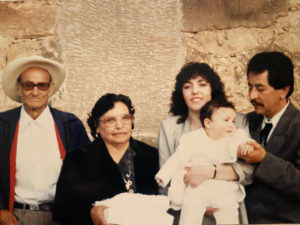
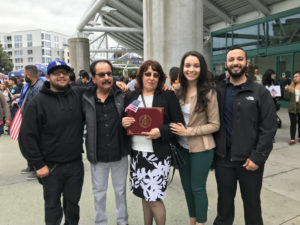



 Notes on the order of deaconesses in the Eastern Church (3rd-12th century)Deaconesses as a canonical order first appear in the third-century Didascalia.
Notes on the order of deaconesses in the Eastern Church (3rd-12th century)Deaconesses as a canonical order first appear in the third-century Didascalia.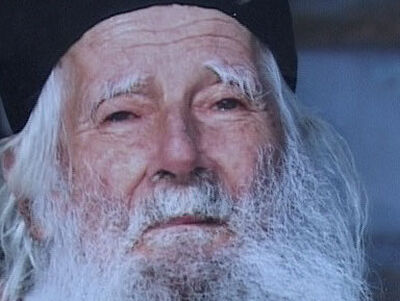 “The Priesthood is the Most Terrible Thing on Earth”Even if I had graduated from all the schools of this world, even the highest schools, not a single one of them would have been as useful for me as the school of sufferings.
“The Priesthood is the Most Terrible Thing on Earth”Even if I had graduated from all the schools of this world, even the highest schools, not a single one of them would have been as useful for me as the school of sufferings.
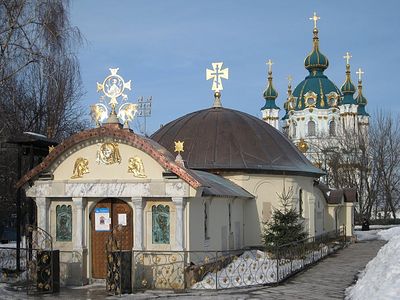 Ukrainian nationalists vandalize and set fire at Kiev monasteryRepresentatives of the nationalistic terrorist group C-14 attacked the Monastery “of the Tithes” in Kiev yesterday. In two incidents, they vandalized and set fire to monastery property and abused those who tried to stop them.
Ukrainian nationalists vandalize and set fire at Kiev monasteryRepresentatives of the nationalistic terrorist group C-14 attacked the Monastery “of the Tithes” in Kiev yesterday. In two incidents, they vandalized and set fire to monastery property and abused those who tried to stop them.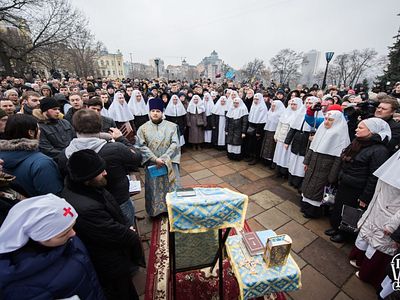 Thousands come out to defend Tithes Monastery from Ukrainian radicals (+ VIDEO)More than 3,000 faithful Orthodox Christians came out and stood for ten hours through the night, prayerfully protecting the monastery from those who hate the Church of God.”>More than 3,000 came out to defend the monastery on the same day. The former abbot of the Tithes Monastery, His Grace Bishop Gideon of Makarov, was temporarily
Thousands come out to defend Tithes Monastery from Ukrainian radicals (+ VIDEO)More than 3,000 faithful Orthodox Christians came out and stood for ten hours through the night, prayerfully protecting the monastery from those who hate the Church of God.”>More than 3,000 came out to defend the monastery on the same day. The former abbot of the Tithes Monastery, His Grace Bishop Gideon of Makarov, was temporarily 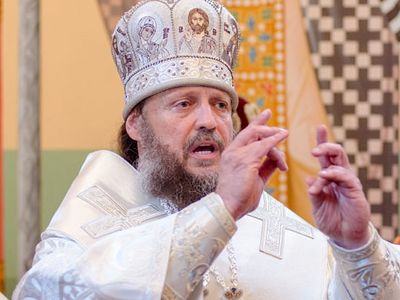 Ukraine cancels citizenship, deports bishop as he returns from speaking to US Congress about persecution in UkraineThe bishop and abbot was escorted to a departing plane by men bearing automatic rifles.”>deprived of his Ukrainian citizenship in 2019-2020 after he spoke out about the persecution of the Church.
Ukraine cancels citizenship, deports bishop as he returns from speaking to US Congress about persecution in UkraineThe bishop and abbot was escorted to a departing plane by men bearing automatic rifles.”>deprived of his Ukrainian citizenship in 2019-2020 after he spoke out about the persecution of the Church. 
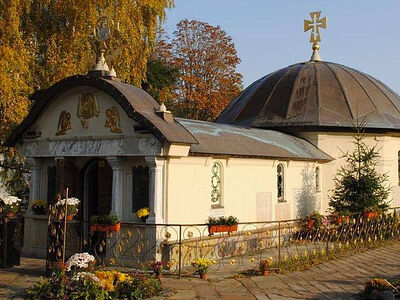 Ukraine: court orders destruction of Tithes Church, built on site of first Kievan cathedralThe new church was vandalized and set on fire on January 25, 2018. On February 3, about 200 radicals staged a protest near the monastery, calling for its dismantling.
Ukraine: court orders destruction of Tithes Church, built on site of first Kievan cathedralThe new church was vandalized and set on fire on January 25, 2018. On February 3, about 200 radicals staged a protest near the monastery, calling for its dismantling. Ukrainian museum raising funds to dismantle a church that it calls “garbage”The National History Museum of Ukraine is collecting funds to demolish Kiev’s Sts. Vladimir and Olga-Tithes Church, which belongs to the canonical Ukrainian Orthodox Church.
Ukrainian museum raising funds to dismantle a church that it calls “garbage”The National History Museum of Ukraine is collecting funds to demolish Kiev’s Sts. Vladimir and Olga-Tithes Church, which belongs to the canonical Ukrainian Orthodox Church.

 Revelation: Removing the VeilThis revelation was given by God to the Apostle John because we needed to know it.
Revelation: Removing the VeilThis revelation was given by God to the Apostle John because we needed to know it. If Christ Is With Us, Death Is DefeatedThe book of Revelation teaches us a lot, especially when we begin to carefully delve into its words, when we see how Christ holds the world in His hands and acts with wisdom in all things.”>Part 2,
If Christ Is With Us, Death Is DefeatedThe book of Revelation teaches us a lot, especially when we begin to carefully delve into its words, when we see how Christ holds the world in His hands and acts with wisdom in all things.”>Part 2,  Why Did the Lord Leave Man the Book of Revelation?Only the people of God, the saints, can receive revelations from God, and only they can interpret them, because a revelation, words from God, is given from God, from the Holy Spirit.”>Part 3,
Why Did the Lord Leave Man the Book of Revelation?Only the people of God, the saints, can receive revelations from God, and only they can interpret them, because a revelation, words from God, is given from God, from the Holy Spirit.”>Part 3,  For the Time Is at Hand…We have to understand that God acts outside of time, and the events of Revelation don’t relate only to the end times.”>Part 4,
For the Time Is at Hand…We have to understand that God acts outside of time, and the events of Revelation don’t relate only to the end times.”>Part 4,  Blessed Is He That Readeth…Christ sent the revelation through an angel to His servant the Apostle and Evangelist John, who conveyed the word of God and the testimony of Jesus Christ about what he saw and heard.”>Part 5,
Blessed Is He That Readeth…Christ sent the revelation through an angel to His servant the Apostle and Evangelist John, who conveyed the word of God and the testimony of Jesus Christ about what he saw and heard.”>Part 5,  He Hath Made Us Kings and PriestsA man who is close to God, my dears, truly feels like a king—he has no need of anything. At the same time, he may have absolutely nothing.”>Part 6,
He Hath Made Us Kings and PriestsA man who is close to God, my dears, truly feels like a king—he has no need of anything. At the same time, he may have absolutely nothing.”>Part 6,  John, Our Companion in Tribulation, and in the Kingdom and Patience of Jesus ChristOne of the most significant and frequent references to the Holy Trinity is in the text of Revelation.”>Part 7,
John, Our Companion in Tribulation, and in the Kingdom and Patience of Jesus ChristOne of the most significant and frequent references to the Holy Trinity is in the text of Revelation.”>Part 7,  Because Thou Hast Left Thy First Love…The greatest miracle is that the Church exists.”>Part 8,
Because Thou Hast Left Thy First Love…The greatest miracle is that the Church exists.”>Part 8,  Fear None of Those Things Which Thou Shalt SufferThus, God says the following: He is the First and the Last, the Beginning and the End. Nothing exists outside of Him; in Him is everything. He is the Beginning and End of all things.”>Part 9
Fear None of Those Things Which Thou Shalt SufferThus, God says the following: He is the First and the Last, the Beginning and the End. Nothing exists outside of Him; in Him is everything. He is the Beginning and End of all things.”>Part 9 
 Anger—How to Conquer the Beast Inside YouI get terrified as I hear this! What should I do, a sinful and fallen man? How can I learn to control myself? How can I “conquer” sinful anger inside me?
Anger—How to Conquer the Beast Inside YouI get terrified as I hear this! What should I do, a sinful and fallen man? How can I learn to control myself? How can I “conquer” sinful anger inside me? Holy King and Prophet David (Tenth Century B.C.)The holy Prophet David was the youngest of the eight sons of Jesse, the elder of the city of Bethlehem, a descendant of Judah, to whom his father Jacob promised rule over the Israelites until the Coming of Christ the Savior.”>Prophet David says in Psalm 134, as we sing at the Polyeleos at Vigil: They have a mouth but shall not speak, eyes have they and shall not see. Ears have they and shall not hear, nor is there any breath in their mouth (vv. 16-17). Who is this about? About a man who has sensory organs but doesn’t hear, doesn’t speak, doesn’t see anything that’s happening around him. He’s trapped inside his greed and self-satisfaction. He’s satisfied with everything, he doesn’t care about his salvation, about his path to the Kingdom of God. He worries about nothing; everything is arranged for him. Of course, surprises await him.
Holy King and Prophet David (Tenth Century B.C.)The holy Prophet David was the youngest of the eight sons of Jesse, the elder of the city of Bethlehem, a descendant of Judah, to whom his father Jacob promised rule over the Israelites until the Coming of Christ the Savior.”>Prophet David says in Psalm 134, as we sing at the Polyeleos at Vigil: They have a mouth but shall not speak, eyes have they and shall not see. Ears have they and shall not hear, nor is there any breath in their mouth (vv. 16-17). Who is this about? About a man who has sensory organs but doesn’t hear, doesn’t speak, doesn’t see anything that’s happening around him. He’s trapped inside his greed and self-satisfaction. He’s satisfied with everything, he doesn’t care about his salvation, about his path to the Kingdom of God. He worries about nothing; everything is arranged for him. Of course, surprises await him.  Perspectives on DeathSo, I was thinking: why don’t we all write a summary of the life we lived at some point? I bet without a doubt it’ll scare us; some will break out into a cold sweat, and from this, good life changes will be born. Mortal memory, after all, is so… creative.
Perspectives on DeathSo, I was thinking: why don’t we all write a summary of the life we lived at some point? I bet without a doubt it’ll scare us; some will break out into a cold sweat, and from this, good life changes will be born. Mortal memory, after all, is so… creative.

